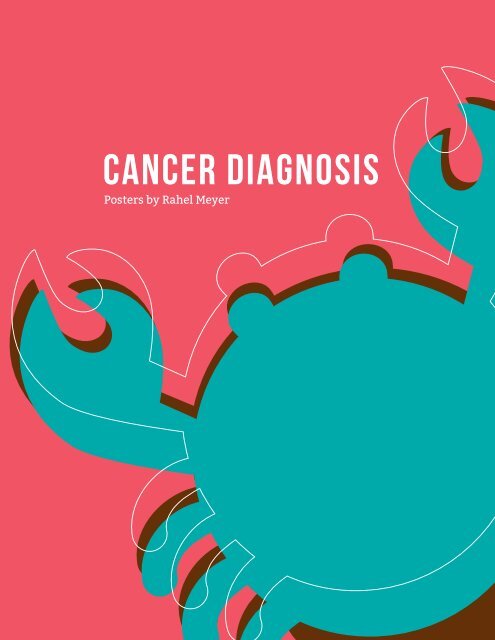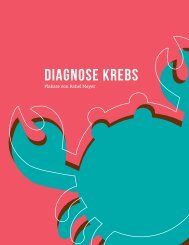Cancer Diagnosis - Posters by Rahel Meyer
With the posters in this publication, graphic designer Rahel Meyer recounts the impact that cancer has on her life – also after completion of treatment. Using simple elements, she illustrates how cancer affects everyday life and provides insight into her world of thoughts and feelings. Despite the gravity of the subject matter, a healthy dose of subtle, life-affirming humor resonates in the posters.
With the posters in this publication, graphic designer Rahel Meyer recounts the impact that cancer has on her life – also after completion of treatment. Using simple elements, she illustrates how cancer affects everyday life and provides insight into her world of thoughts and feelings. Despite the gravity of the subject matter, a healthy dose of subtle, life-affirming humor resonates in the posters.
You also want an ePaper? Increase the reach of your titles
YUMPU automatically turns print PDFs into web optimized ePapers that Google loves.
CANCER DIAGNOSIS<br />
<strong>Posters</strong> <strong>by</strong> <strong>Rahel</strong> <strong>Meyer</strong>
CANCER diagnosis<br />
<strong>Posters</strong> <strong>by</strong> <strong>Rahel</strong> <strong>Meyer</strong>
CANCER DIAGNOSIS<br />
Every year, approximately 37,000 people in Switzerland are confronted with a diagnosis of<br />
cancer. Along with the diagnosis comes shock, fear and sadness, besides having to endure<br />
time-consuming therapies with consequential side effects, the outcome of which remains<br />
uncertain. Even when treatments progress positively, the fear of cancer recurrence often<br />
remains for the rest of one’s life.<br />
Generally, this reality plays out behind closed doors at home, in waiting rooms and in<br />
aseptic treatment rooms. For those on the outside, it is often difficult to be able to relate to<br />
what the diagnosis unleashes in a person suffering from cancer and the plethora of questions<br />
he or she has to deal with.<br />
With the posters in this publication, graphic designer <strong>Rahel</strong> <strong>Meyer</strong> recounts the impact<br />
that cancer has on her life – also after completion of treatment. Using simple elements, she<br />
illustrates how cancer affects everyday life and provides insight into her world of thoughts<br />
and feelings. Despite the gravity of the subject matter, a healthy dose of subtle, life-affirming<br />
humor resonates in the posters.<br />
<strong>Rahel</strong> <strong>Meyer</strong> is a freelance graphic designer and illustrator.<br />
She lives and works in Lucerne, Switzerland.
DIAGNOSIS<br />
Before a diagnosis can be made, a patient has to undergo numerous examinations.<br />
This means waiting over and over again – endlessly and anxiously – for the results.
positive test result<br />
=<br />
bad news<br />
NEgative test result<br />
=<br />
Good news
OPERATION<br />
Treatment for most cancer patients involves an operation. The goal of an operation is to sample<br />
tissue for diagnostic purposes and – if possible – to remove the tumor as completely as possible.
ChemotherapY<br />
Patients treated with chemotherapy receive medications (cytostatics) that inhibit the growth<br />
of cancer cells or even kill them. Cytostatics can be injected, administered <strong>by</strong> an infusion<br />
or ingested in the form of tablets.
Whatcha doin’?<br />
I’m on a drip in the oncology clinic.<br />
Oh! Is it like really bad?<br />
So-so. Chemo takes about 1½ hours.<br />
11:13 33<br />
Chin up! You can do it!
SIDE EFFECTS<br />
Most cytostatic agents destroy not only cancer cells, but also healthy cells – especially those that<br />
divide rapidly: for example, the mucosal cells in the intestine, or hair roots and blood cells.<br />
Many cytostatics cause side effects: for example, diarrhea, loss of hair, anemia and<br />
increased susceptibility to infectious diseases. Chemotherapy can also cause nausea,<br />
vomiting and fatigue.
nerve damage<br />
loss of appetite<br />
aching muscles<br />
hot flushes<br />
skin and nail problems<br />
taste changes<br />
blood count changes<br />
diarrhea<br />
hair loss<br />
fatigue<br />
nausea<br />
vomiting<br />
I accept that there are possible side effects:<br />
Yes<br />
No
CHEMOTIONAL
EMOTIONS<br />
A cancer diagnosis is for patients themselves and their surroundings a serious emotional<br />
crisis. How do you deal with such conflicting emotions as hope and hopelessness?<br />
With fears of loss or even the fear of dying?
at home<br />
en route
HAIR LOSS<br />
A frequent side effect of chemotherapy is the loss of hair on the head and the body.<br />
The eyebrows and eyelashes often fall out as well. Replacing lost hair with a wig helps<br />
many cancer patients – especially women – feel more comfortable in day-to-day life.
Hair<br />
As soon as the body breaks down and eliminates the medications, the hair begins to grow<br />
back – in most cases, faster and stronger than before. Sometimes it is softer or curlier,<br />
some people have more grey hair, others less.
AFTER-EFFECTS<br />
After chemotherapy, many patients suffer from cognitive impairment, which is commonly<br />
referred to as "chemo brain". This manifests itself in, among other things, memory lapses,<br />
a lack of concentration or slower thinking and decision-making processes.
RADIATION THERAPY<br />
Radiation therapy (radiotherapy) involves the use of high-energy rays directed at the tumor.<br />
These rays – for example, gamma or electron radiation – damage the genetic substance (DNA) of<br />
the cancer cells so that they can no longer divide and subsequently die. The rays damage not only<br />
the cancer cells, but also the cells in the surrounding healthy tissue, which is also irradiated.
Side Effects<br />
The skin reacts differently, depending on the kind of radiation therapy (location, amount,<br />
single dosage and total dosage). The daily treatments can extend over a number of weeks.<br />
Treating breast cancer or a tumor in the mouth or neck area requires a relatively strong dose<br />
of radiation. A skin reaction resembling sunburn may occur after two to three weeks.
RADI<br />
NT
FAMILY<br />
DOCTOR<br />
ONCOLOGY<br />
GENERAL<br />
HOSPITAL<br />
NOVEMBER 14th<br />
RADIOLOGY<br />
APRIL 20th APRIL 21th APRIL 22th APRIL 23th APRIL 27th<br />
MAY 8th MAY 15th MAY 22th MAY 29th<br />
JUNE 4th<br />
JULY 16th<br />
BREAST<br />
CLINIC<br />
JANUARY 23th<br />
FEBRUARY<br />
MARCH 7th<br />
JUNE 12th<br />
JUNE 13th<br />
JUNE 18th<br />
JUNE 25th<br />
MAY 1st<br />
JULY 4th<br />
JULY 30th JULY 31th AUGUST 2nd AUGUST 3rd AUGUST 6th<br />
AUGUST 8th<br />
FEBRUARY 23th<br />
JULY 18th JULY 19th JULY 20th JULY 23th JULY 24 JULY 25 JULY 26th<br />
AUGUST 7th<br />
AUGUST 14th<br />
AUGUST 9th<br />
AUGUST 16th<br />
AUGUST 20th AUGUST 21th AUGUST 22th<br />
AUGUST 27th<br />
OCTOBER 16th<br />
JANUARY 24th<br />
FEBRUARY 20th<br />
MARCH 5th<br />
AUGUST 28th<br />
OCTOBER 18th<br />
NOVEMBER 18th<br />
AUGUST 10th<br />
JANUARY 8th JANUARY 14th JANUARY 29th<br />
FEBRUARY 26th<br />
FEBRUARY 24th<br />
AUGUST 20th SEPTEMBER 5th<br />
JANUARY 26th<br />
FEBRUARY 21th<br />
AUGUST 17th<br />
AUGUST 29th<br />
DECEMBER 18th<br />
MARCH 12th<br />
FEBRUARY 6th<br />
FEBRUARY 28th<br />
MARCH 8th MARCH 9th MARCH 13th MARCH 16th<br />
MARCH 29 APRIL 11th APRIL 18th<br />
AUGUST 13th<br />
AUGUST 23th<br />
AUGUST 24th<br />
AUGUST 31th<br />
NOVEMBER 8th<br />
FEBRUARY 19th<br />
SEPTEMBER 24th<br />
FEBRUARY 22th<br />
MARCH 26th
CALENDAR<br />
Everyday life for cancer patients is shaped <strong>by</strong> hospital appointments with doctors and<br />
therapists. For many weeks and months, their life is largely determined <strong>by</strong> the treatments.
CHECK-UPS<br />
Even after treatments are completed, patients are still confronted with cancer. Emotionally<br />
processing such an experience is one thing, but the regular follow-ups – generally for one’s<br />
entire life – are another thing, because they are often coupled with the fear of cancer<br />
reappearing. For instance, there is a higher risk of developing a secondary tumor especially<br />
after radiation therapy – even many years after the treatment.
PERSONAL APPROACH<br />
All cancer patients deal with the disease in their own, individual way. With repression, fear,<br />
courage, withdrawal, a fighting spirit – and sometimes with humor.
IMPRINT<br />
Idea, concept and design: <strong>Rahel</strong> <strong>Meyer</strong><br />
Texts: <strong>Rahel</strong> <strong>Meyer</strong>, Petra <strong>Meyer</strong><br />
English translation: Sharon Kroska<br />
Purchase: info@meyer-grafik.ch<br />
Contact: meyer-grafik.ch<br />
© <strong>Rahel</strong> <strong>Meyer</strong>, all rights reserved





